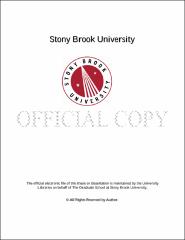| dc.identifier.uri | http://hdl.handle.net/11401/77187 | |
| dc.description.sponsorship | This work is sponsored by the Stony Brook University Graduate School in compliance with the requirements for completion of degree. | en_US |
| dc.format | Monograph | |
| dc.format.medium | Electronic Resource | en_US |
| dc.language.iso | en_US | |
| dc.publisher | The Graduate School, Stony Brook University: Stony Brook, NY. | |
| dc.type | Dissertation | |
| dcterms.abstract | Major depressive disorder (MDD) is associated with abnormal neural activity elicited by affective stimuli and reward, yet results have been inconsistent across studies and have at times been contradictory. Discrepancies may be due in part to the wide range of laboratory paradigms and stimuli that have been used. The current study examined this issue by recording event-related potentials across a battery of four tasks within a single MDD sample. First, using two emotional reactivity tasks, the moderating effect of the personal relevance of stimuli was examined; normative and idiographic affective stimuli were contrasted. Second, using two environmental feedback tasks, monetary and performance feedback were contrasted. ERPs were collected from adult females with current unipolar depression (n=36) and never-depressed controls (n=44). Across the two emotional reactivity tasks, distinct abnormalities were observed: The late positive potential elicited by normative unpleasant images, as well as normative pleasant and unpleasant words, was blunted in the MDD compared to the control group. By contrast, the late positive potential elicited by idiographic pleasant and unpleasant words--stimuli describing participants' own moods--was increased in the MDD compared to the control group. This pattern suggests that MDD is associated with neither a global increase nor decrease in emotional reactivity, but that abnormalities are context-specific and relate to the personal relevance of stimuli. Group effects were also observed across the two feedback tasks: The feedback negativity elicited by monetary outcomes was blunted in the MDD group, but the response elicited by performance feedback was intact and comparable in magnitude to controls. This suggests that impaired feedback processing in MDD is specific to reward information. Group differences in emotional reactivity and reward sensitivity were largely unrelated across individuals, suggesting the presence of relatively unique neural deficits that may relate to clinically distinct subgroups. Consistent with this possibility, the blunted neural response to monetary reward was specific to those MDD participants reporting impaired mood reactivity, a core symptom of melancholic depression. Future research will be necessary to clarify how each of these abnormal neural responses may uniquely relate to MDD onset, course, and treatment outcome. | |
| dcterms.available | 2017-09-20T16:52:10Z | |
| dcterms.contributor | Hajcak, Greg | en_US |
| dcterms.contributor | Squires, Nancy | en_US |
| dcterms.contributor | Klein, Daniel | en_US |
| dcterms.contributor | Pizzagalli, Diego. | en_US |
| dcterms.creator | Foti, Daniel Justin | |
| dcterms.dateAccepted | 2017-09-20T16:52:10Z | |
| dcterms.dateSubmitted | 2017-09-20T16:52:10Z | |
| dcterms.description | Department of Clinical Psychology. | en_US |
| dcterms.extent | 81 pg. | en_US |
| dcterms.format | Application/PDF | en_US |
| dcterms.format | Monograph | |
| dcterms.identifier | http://hdl.handle.net/11401/77187 | |
| dcterms.issued | 2015-08-01 | |
| dcterms.language | en_US | |
| dcterms.provenance | Made available in DSpace on 2017-09-20T16:52:10Z (GMT). No. of bitstreams: 1
Foti_grad.sunysb_0771E_11267.pdf: 1116698 bytes, checksum: a1cf82615289cdcd931e7a5d26f0c830 (MD5)
Previous issue date: 2013 | en |
| dcterms.publisher | The Graduate School, Stony Brook University: Stony Brook, NY. | |
| dcterms.subject | Depression, EEG, Emotion, ERP, Reward | |
| dcterms.subject | Clinical psychology | |
| dcterms.title | Abnormal Emotional Reactivity and Reward Sensitivity in Major Depressive Disorder: Evidence from Event-Related Potentials | |
| dcterms.type | Dissertation | |

